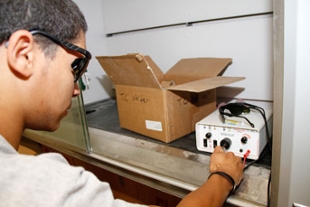Two Sets of Twins Participate In JMU's Summer Lab Program
News
REU Programs at JMU
Wandering around the Physics and Chemistry Building this summer you might think you are seeing double. And double again. James Madison University's Research Experience for Undergraduates is hosting two sets of twins.
Jamel and Jarvis Mitchum are JMU junior chemistry majors studying in Dr. Gina MacDonald's chemistry REU.
Darius Reynolds, a junior mechanical and aerospace engineering major at West Virginia University, and Lee Reynolds, a JMU junior integrated science and technology major, are in the materials science REU run by Dr. Chris Hughes.
"In all the years we've done this I can only remember one other set of twins," Hughes said. "It is sort of a lightning strike to have two set of twins."
Both pairs of brothers were looking to round out their academic resumes and found the summer REU to be a perfect match.
Students are in the lab from 9 a.m. to 5 p.m. Monday through Friday for 10 weeks. Group meetings, round table discussions, guest speakers and science-based field trips are also part of the experience.

MacDonald said, "When students learn through doing research they get excited about their major and learn really important problem solving skills, how to perform experiments and how to interpret and design new experiments, basically they learn how to think."
Funded by the National Science Foundation, the Department of Defense's Awards to Stimulate and Support Undergraduate Research Experiences program and JMU, the REU program targets students in the early parts of their academic careers who are looking to enhance their scientific research experience.
JMU is one of only a handful of schools nationwide to offer this experience primarily to undergrads. This year students from 15 institutions are enrolled in JMU REU programs.
The prolonged lab time and professor-mentor relationship in the summer are a great benefit to the students.
Hughes said, "A unique aspect of the REU program at JMU is how much actual time the students spend being directly mentored by JMU professors. It is almost as if each day all summer long is a class of its own, taught by a full-time faculty member with a student to faculty ratio of 2- or 3-to-1."

As expected, the Reynolds brothers finish each other's sentences when describing their experience. "Much better than a lab class. The summer is good because it's more than theory; there are no right answers. Being in the lab is our job! We get more experience and we get paid."
Lee Reynolds plays running back on the JMU football team. When his adviser suggested the REU program he checked with his strength and conditioning coach to work out his schedule. He is in the gym from 6 to 8:30 a.m. each day, showers and heads to the lab. He recruited his brother to come to JMU for the summer because with his football commitments he does not get to see his twin very often. "I think we have spent less than 20 days together since we went to college," said Lee Reynolds.
The opposite is true for the Mitchum twins. Jamel and Jarvis Mitchum were freshman roommates, play on intramural teams together, and share the same major. This past spring, they went on separate Alternative Spring Break trips – the longest they had ever spent apart.

The Mitchum brothers are equally enthusiastic about the lab experience. Chemistry professors and upperclassmen in their major told the brothers the chemistry REU was not to be missed. "This is a good opportunity to find out if working in a chemistry lab is what I want to do," said Jamel Mitchum. Jarvis Mitchum said, "If we want to go to graduate school we need undergraduate research experience."
Both sets of twins are black men, which brings an element of diversity to the REU programs. Darius Reynolds thinks this is important. "In engineering we work on teams so diversity is good, everyone brings something different to the team."
All four students see themselves as role models for their high-school friends, teammates, students in their major and college friends. Jarvis Mitchum said, "We are setting an example. We've done this, you can to. Don't let your ethnicity get in your way."
In the materials science REU Darius Reynolds is designing and building a device to characterize fluid flow in TECHLAB's testing cassettes and then using the device to characterize improvements in two specific cassette designs. Lee Reynolds is building a computer-based electronic data acquisition and control system for biology Assistant Professor Justin Brown.
Jarvis Mitchum is working to quantify neurotransmitter metabolites in urine. He is also helping to study how the activity of the enzyme (phosphoglycerate kinase) is altered as a function of pH. Jamel Mitchum will be purifying and characterizing the DNA repair protein RecA.
Jarvis Mitchum sums up his experience so far saying, "Whether it's researching, experimenting, talking to other students or my professor, I've learned something new every day."
The summer REU ends with a symposium for all students to share their work with peers and professors.
Hughes said, "We try to make sure the symposium looks and feels a lot like a professional meeting they might attend elsewhere. It is typically the case that a lot of these students do go on to regional or national meetings in the next academic year, so this is also a safe practice run for that experience."
This year the symposium will take place July 29-30.

